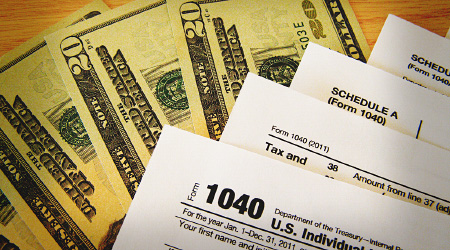7 Income Tax Tips: Increase Your Tax Refund

It's that time of year again when the taxman wants to know how much you have earned and how much tax you owe him. Don't forget that your individual tax return has to be returned to the Internal Revenue Service (IRS) by April 15 this year, unless you have applied for, and received an extension.
We all want to pay less tax, but instead of looking for loopholes and gray areas, rather focus on managing your tax affairs as efficiently as possible. The following business and personal tips should make the current tax year a little easier on your pocket when completing your return:
1. Travel Expenses
It is good practice to keep a mileage logbook of distance traveled, in order to accurately determine you travel deduction. If you have two jobs, you can deduct the cost of traveling from the first to the second, but if you have a single job, you cannot deduct commuting costs because it is considered a personal expense, not a business expense. Travel for business, including costs to go to seminars and conferences are 100% deductible. Deductible travel costs include hotels, airfare, taxis, car rentals, parking fess, tolls and tips.
2. Medical Expenses
Keep records (including invoices and statements) of medical expenses which are not covered by your medical aid, in order to get a deduction for those expenses on assessment. Depending on your income, certain medical expenses including health insurance and dental insurance premiums may be deductible. This deduction is limited to costs over 7.5% of your income. Pursue turning your non-deductible personal medical expenses into a legitimate business expense.
3. Entertainment Expenses
Be careful of entertainment allowances. Since March 1, 2002, no deductions can be claimed against entertainment allowances for personal reasons. Make sure your employer is aware of this and that the allowances are taxed in full, otherwise you might end up with a tax liability on assessment. You may however deduct "ordinary and necessary" business meal and entertainment expenses up to 50%.
4. Tax Records
Why not make your life easier and ensure that you don't miss any deductions by organizing your record keeping system early and keeping it updated. Not only does having organized records make it easier and less frustrating for you to file your tax return, it also enables you to explain an item on your return that the IRS might question, and could prevent you from having to pay additional taxes and penalties for unsubstantiated items. Although legally you need only keep tax records for three years , you should keep a copy of the returns in case you need information from these returns at some point.
5. Electronic Filing
If you want your return processed in approximately half the time of a paper return, you should consider filing the forms electronically. IRS E-file makes you life a lot easier as it picks up problems with your returns instantly and provides immediate feedback and confirmation regarding your return.
6. Avoid Refund Anticipation Loans
While it would be nice to get your money back in your pocket as soon as possible, it is much better to wait for your refund. The downside of these loans is that the annual interest rates on them are very high, usually between 50% and 500%. So between the loan fee, tax preparation fees and other administrative fees imposed on the loan, you end up losing a big portion of your refund.
7. Deadlines
Be aware of deadlines in order to avoid penalties. Tax returns must be submitted before the due date given by the IRS. If your previous years' tax affairs are up-to-date, an extension for submission of the return can be requested. However, extensions are granted less frequently, depending on your particular circumstances.
Conclusion
Tax season makes everyone a little nervous. Rather start early to allow yourself time to prepare and to ensure that you are taking full advantage of every eligible tax break.







